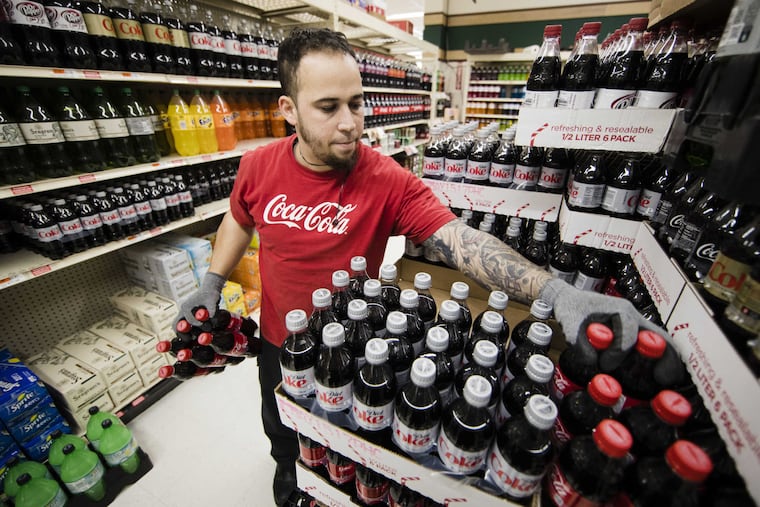Appellate panel to hear soda tax arguments
The city’s sweetened-beverage tax is headed back to court. A panel of seven Commonwealth Court justices will hear arguments over its legality Wednesday in Pittsburgh.

The city's sweetened-beverage tax is headed back to court.
A panel of seven Commonwealth Court justices will hear arguments over the legality of the tax Wednesday in Pittsburgh.
The American Beverage Association, along with several Philadelphia residents and businesses, filed suit against the tax in September. A Common Pleas Court judge rejected their arguments and upheld the tax in December. The decision was appealed to Commonwealth Court, a statewide appellate court responsible for cases involving local governments.
Tax opponents will argue in a morning hearing that the lower court's dismissal of their challenge should be reversed and the tax overturned. Shanin Specter and Charles Becker of Kline & Specter PC and Marc J. Sonnenfeld, John P. Lavelle Jr., and Thomas J. Sullivan of Morgan, Lewis & Bockius LLP are representing the challengers.
The city will defend its 1.5 cent-per-ounce tax on sweetened and diet beverages. The tax, levied on distributors, is expected to funnel $92 million per year into the city's general fund to pay for pre-K, community schools. and an overhaul of parks and recreation centers. Mark A. Aronchick will present arguments on behalf of the city.
The appellants' arguments center on the premise that the tax, while levied on distributors, amounts to a sales tax because it is often passed on to retailers.
"The key is how the tax actually operates in the real world, not what label is put on it by the government," the lawsuit states.
The city has argued that the tax is not a sales tax because it is levied on distributors. How businesses choose to react is irrelevant to the tax's legality, the city says.
The lawsuit contends that the tax also violates state law requiring similar products to be taxed uniformly. Since beverages are taxed by the ounce, more expensive drinks wind up taxed at a lower rate.
The city has pointed to multiple incidents of volume-based taxes being upheld under the state constitution.
Also at issue is the federal Supplemental Nutrition Assistance Program, known as food stamps. Products purchased with food stamps are exempt from sales taxes. If considered a sales tax, the beverage tax on those purchases violates state and federal law, the suit argues.
The case, Lora Jean Williams et al v. City of Philadelphia, gets its name from one of the plaintiffs, a Philadelphia resident on food stamps who, according to the lawsuit, is afraid she will not be able to afford her monthly groceries given the rise in cost of two-liter bottles of soda.
The stakes are high for the beverage industry, which spent more than $10.6 million in opposition to the tax and has since watched similar taxes pop up in Boulder, Colo.; San Francisco, Oakland, and Albany, Calif.; and Cook County, Ill., which includes Chicago.
Kenney, too, has a lot to lose. His banner pre-K program will not grow, the city has said, without the levy. As long as the tax is in litigation, the city has said, it will not move forward with a plan to borrow money to rebuild parks and recreation centers.
The city has spent $999,359 on litigation fees and costs for the beverage tax lawsuit. Total costs for the current fiscal year are capped at $1.6 million. The Arnold Foundation, a nonprofit based in Washington, which has supported soda tax efforts nationwide for health reasons, is contributing $500,000 toward the city's defense.
Supportive briefs have been filed on both sides. A group of state lawmakers backed the opposition in February, and several groups, including the African American Chamber of Commerce, filed a brief in support of the levy.